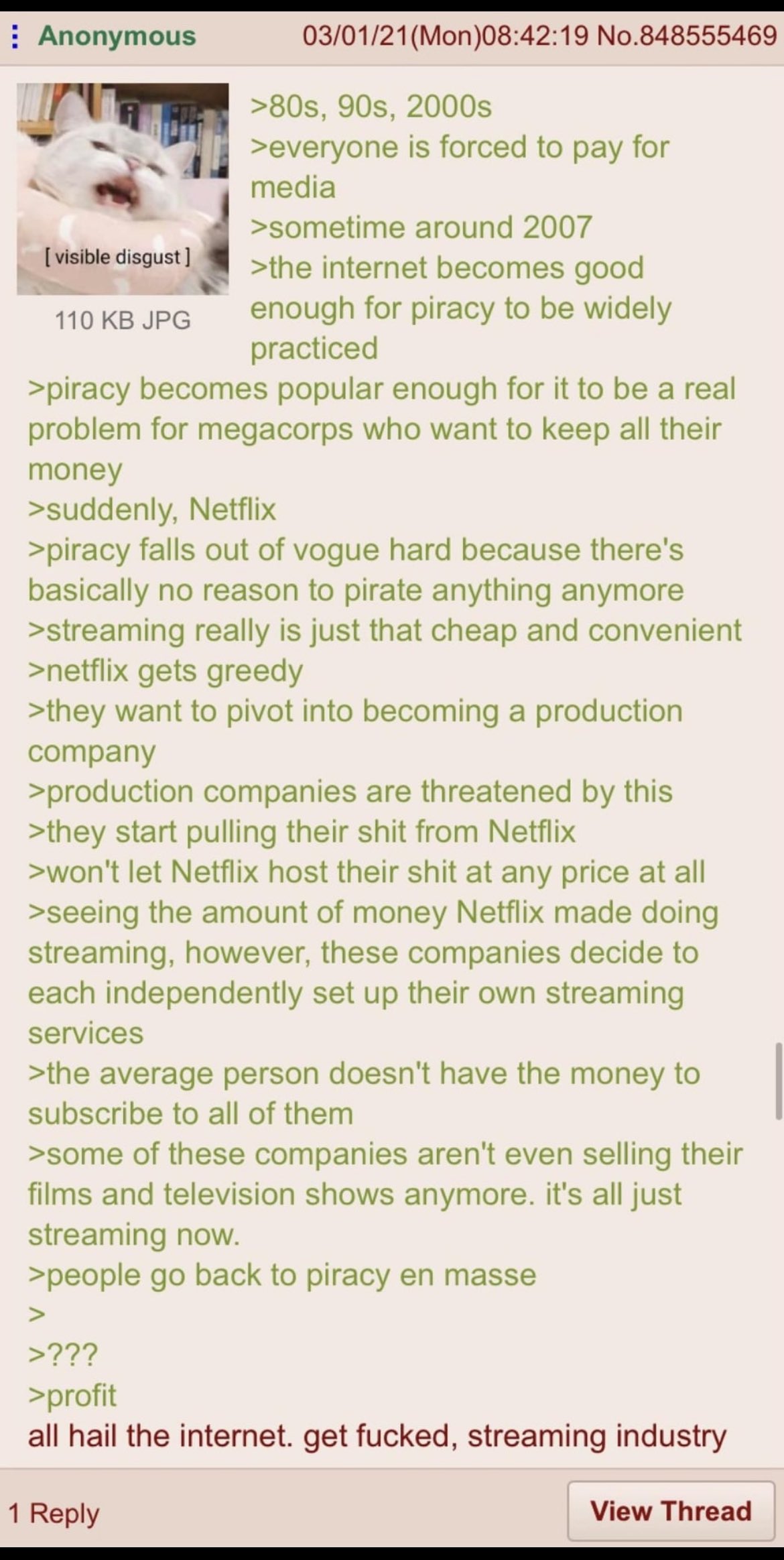this post was submitted on 25 Dec 2024
1461 points (98.2% liked)
Greentext
6638 readers
1563 users here now
This is a place to share greentexts and witness the confounding life of Anon. If you're new to the Greentext community, think of it as a sort of zoo with Anon as the main attraction.
Be warned:
- Anon is often crazy.
- Anon is often depressed.
- Anon frequently shares thoughts that are immature, offensive, or incomprehensible.
If you find yourself getting angry (or god forbid, agreeing) with something Anon has said, you might be doing it wrong.
founded 2 years ago
MODERATORS
you are viewing a single comment's thread
view the rest of the comments
view the rest of the comments

Netflix has a market cap of 300bn. Public markets picked up right where venture capital left off no bother. The problem I think was the competitive forces as much as enshitified business model, though perhaps one cannot exist without the other. Certainly without doing their own content they could easily have become ludicrously profitable as a redistributer only, though I'm not convinced it would have stopped everyone and their dog moving in on the space.
Facebook is really the cleaner example of enshitification. They could have happily printed modest money for ever as the preeminent social network, but they took the greedy approach and morphed into a cesspool.
Merry Christmas to you!
If you take venture capital, you sacrifice your ability to not be greedy. Could Facebook have even existed without VC? Facebook didn't have ads during its startup IIRC, which meant they had no revenue.
That's a really interesting hypothetical. They always had ads but obviously the early scale and scope was smaller, so revenue was piddling early on. They had pretty limited costs though and were a super hot ticket to give capital to. I mean they needed some kind of financing for their trajectory, which maybe anyway would have pushed them to monetize aggressively any which way.
Ultimately I don't think we'll ever know and the examples of people choosing not to get filthy rich off the back of these innovations are extremely rare. Even when e.g. openAI gets set up explicitly as non profit it gets bastardised, so what chance does a regular joint stock company have of operating in the interests of consumers.
Theu saw the writing on the walls. They knew the big dogs would want a slice of the streaming game and they needed to pivot before the rug got pulled out from ubder them. Hulu was already being constructed when they were recalling shifting into making their own products IIRC. It wasn't just VC that got them to their golden era, they also relied on the industry bot taking streaming seriously enough and giving them deals that they never would today.
This (though you need to fix your typos). Movie companies saw Netflix as a garbage rerun channel. They were chasing after opening weekends. It took a long time for them to finally launch their own service.
Hulu has been around for a very long time (it's also part of why their UI sucks ass while being owned by Disney. It's the same UI they've had for years) they just didn't fully invest in the marketing and content until Netflix proved to C-Suites how viable a streaming service actually was
Wikipedia
Netflix also launched their Internet streaming service in 2007 and in 2011 is when they separated the subscriptions so that the DVD service and the streaming service were different subscriptions, as well as when their first batch of originals/exclusives were released (House of Cards, season 5 of Arrested Development and they were the exclusive North American distributor for the Norwegian TV series Lilyhammer) and it really wasn't for a few more years before all of the content licensing deals started expiring and being non-renewed, somewhere around 2018ish by my memory.
Since the last decade has been a blur, I'll just summarize that HBO Max, Paramount+, Discovery+ and Peacock all didn't launch until the 2020s, meanwhile Disney+ and Apple+ both launched in late 2019, accidentally timing themselves perfectly to grow immensely during the pandemic (and Disney+ was smart in bundling with Hulu since by that point they owned 2/3 of Hulu via their 21st Century Fox acquisition)
So while yes, Hulu probably was a hedge by legacy media companies, they didn't really invest in it until Netflix already owned the streaming landscape